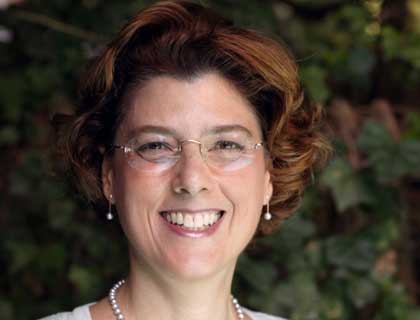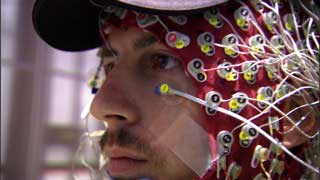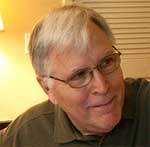[Bianculli here: Pledge periods for PBS stations are notorious for bait-and-switch tactics, but sometimes some very valuable fish can be found among the bait. Contributing writer Tom Brinkmoeller writes about one such public TV special, but using much better metaphors...]

'Science of Healing' Extraordinary -- But How Many Will Get to See It?
It happens to public-TV viewers several times a year: They go to the television listings hoping to find a gem and, instead, hear a loud ripping sound as the local PBS outlet splits its personality and loads its schedule with stunts. The goal always is the same: raise some money to stay on the air. The goal-reaching tactic is one of the most uncharacteristically gauche things these otherwise-rational affiliates do.
This is when feel-good and make-money lecturers take over the stage from actors, not-so-great performances by pop singers preempt masterpieces, and the antiques aren't on the road but on the couch as they and Lawrence Welk attempt to re-create the '50s.
It's also when the letters PBS morph into "Pledge Bait-and-Switch." Viewers attracted enough to these atypical programs to call in a pledge have to be disappointed and disillusioned when Wayne, Suze, Lawrence and company exit and the good stuff returns. They probably rejoin Dancing with the Stars or Glenn Beck, several dollars poorer but, if lucky, with a new coffee mug into which they can cry.
All of which makes it even more ironic when a program created for use during pledge time is as good as the regular PBS programming, but has to compete with the stunt shows to get on the air. That program is The Science of Healing with Dr. Esther Sternberg. The M.D. of the title, shown above, currently is chief of the Neuroendocrine Immunology and Behavior section at the National Institute of Mental Health. She's an authoritative researcher and an author. Being pledge time, one might expect such a program to be filled with a lot of podium time, bromide-spouting and large-chart displays.
None of that.
Matt Cohen, an executive producer of the program, calls it "a very low budget show that doesn't look like it. Every dollar is on the screen."
The hour-long show opens in Greece, where Dr. Sternberg, a rheumatologist, accidentally discovered that venues, food and other sense stimuli, when positive, can reduce stress and assist the brain in alleviating physical problems -- in her case, arthritis. In the confines of a single program, Dr. Sternberg explains and demonstrates that theory by visiting researchers who show the healing power of the brain when lower stress levels prevail.
"Each sense can trigger memories that trigger emotional responses that can help you heal -- or not, depending on whether they are positive (reduce stress response) or negative (increase stress response)," she explained.
It's a scientifically sound, fast-moving, easily understood program with the kind of high production values that put it on an equal plane with PBS' excellent science-based series.
The big question is how many people will even get an opportunity to watch this program. Matt Cohen and his brother Renard, whose Resolution Pictures produced it, originally pitched the knowledge contained in Dr. Sternberg's research to PBS as a 13-episode series. Not enough money for a series, they were told, and were introduced to another group of funders, the people who finance pledge programming. A yes from them, plus a timely invitation to a Greece-Crete press junket, made production possible.

And now that it is complete, The Science of Healing goes onto a large menu of shows from which PBS member stations can choose to fill their schedules during pledge time. It stays there for three years, during which it can become a "Waldo" hidden among all kinds of varied offerings. Getting local programmers to watch, and then use, the show is an even bigger challenge than producing a high-quality, genuinely useful, easily understood science special.
Crucial fund-raising, it seems, happens during pledge drives, and some stations aren't about to try out a new idea at harvest time. The tendency is to "stick with tried-and-true," Matt Cohen said.
Getting their show on the schedules of larger-market stations is a solution, Renard Cohen said: "Smaller stations want to see how well it does in a major market."
Every pledge-show producer wants time on a big-city station. As a result, a lot of selling goes on: to get on the key stations' schedules and at a time when people watch. The more money raised, the more smoothly the success will spread to other cities. Another oddity of this whole journey is there isn't a process in place to track which stations use a pledge program. If the Cohens want those stats, they have to hire someone to scan countless schedules -- probably the same person they hope to hire to lobby for their show with local programmers.
The hedge mazes of European castles are more easily navigated. But the payoff could be the series that originally was envisioned during the first trip to the PBS well.
"The bigger numbers we can show to a potential underwriter for a series, the better our chances," said Renard Cohen.
Dr. Sternberg sums up what new things such a series would do:
"In many senses we wanted to create a new genre of health and science television that does not elevate science above the masses and focus on disease, but that focuses on health and welcomes viewers into our world of science, and also includes the back-drop of history, archeology, travel and culture."
STATIONS RECENTLY SIGNED TO BROADCAST The Science of Healing INCLUDE:
(All times local)
Nov. 26:
WGBH 2, WGBH HD, Boston MA, 1 a.m.
Nov. 28:
WETA Washington DC, 6 a.m. (repeats Nov. 29, 12:30 p.m.)
Arizona Public Media, 8 a.m.
New Hampshire Public Television, 11 a.m.
KRMA Denver, CO, 11:30 a.m. (repeats Nov. 29, 3:30 a.m.; Dec. 7, 11 p.m.)
WMPT Annapolis MD, 12:30 p.m. (repeats Dec. 11, 10:30 p.m.)
WMPTV Milwaukee, WI, 12:30 p.m. (repeats Dec. 11, 10:30 p.m.)
Nov. 29:
Western Reserve PBS, OH, 4 p.m.
Maryland Public Television, 1:30 a.m.
Dec. 5:
HD 2, Idaho Public Television, 3:30 p.m.
Dec. 6:
KUED Salt Lake City, UT, 4:30 p.m.
--

Tom Brinkmoeller, who has been a caregiver for more than a decade, was curious to see if this show matched the claims contained in its PBS news release. The above enthusiasm reflects the fact that the claims are valid and have added a bright new perspective to a sometimes-challenging commitment.